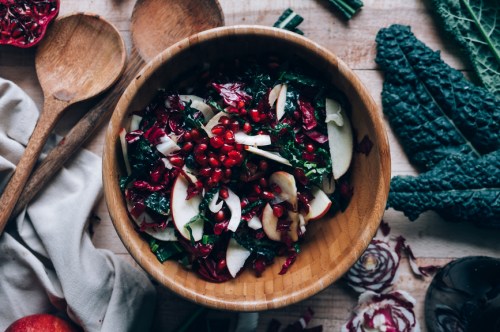When it comes to vitamins, some tend to hog the spotlight more than others in terms of popularity. Vitamin C, for example, comes straight to mind as we inch closer to winter, aka cold season (in terms of temperature and those agonizing nasal infections). However, we should ensure that we’re getting enough of all vitamins to stay in good health year round—vitamin K included.
Experts in This Article
registered dietitian and nutrition educator with Fresh Communications
naturopathic doctor and the medical director of MegaFood, based out of Colorado
In case you’re less familiar with vitamin K, you’ll definitely want to keep reading. Ahead, with the help of two nutrition experts, we’ll cover tell-tale signs you’re not getting enough of it. Plus: an overview of why it’s so important and how to get more vitamin K in your diet.
How vitamin K benefits your health
Erin Stokes, ND, a naturopathic doctor and MegaFood Medical Director, kicks things off by giving a brief summary of this (potentially) lesser-known vitamin. “Vitamin K is a fat-soluble vitamin involved in coagulation, bone metabolism, and cardiovascular health,” she shares. Fun fact: She adds that it gets its name from the Danish word koagulation. (You really do learn something new every day.)
From there, Dr. Stokes adds that the principal forms of vitamin K are K1 (phylloquinone) and K2 (menaquinone). “K1 is found in leafy green vegetables, and K2 is made in the human intestine and also found in fermented foods,” she explains.
Vitamin K deficiency symptoms to be mindful of
On account of its important role in coagulation, Dr. Stokes says that the greatest tell-tale sign that you’re not getting enough vitamin K is excessive bleeding. Such bleeding can be due to a standard cut or scrape that typically would have been minor, but instead seems to be a never-ending stream… or even heavier menstrual bleeding than usual. But that’s not all.
“Some of the most common signs that you’re not getting enough vitamin K are blood clotting taking longer than it should for cuts and open wounds, and bruising easily,” says Bianca Tamburello, RDN. If the latter point applies to you, Dr. Stokes says it may be worthwhile to visit your healthcare practitioner for further investigation. “[They] may decide to do a coagulation test—called prothrombin time (PT)—to determine if you are low in vitamin K,” she says.
Next, since adequate vitamin K is necessary to support bone health (on top of the likes of vitamin D, calcium, and magnesium), signs associated with weakening bones—think fractures, poor posture, back and/or neck pain, and the early signs of osteoporosis—may signal your vitamin K status isn’t where it needs to be. Unfortunately, having weakening bones is less obvious than excessive bleeding, on top of being a more of a long-term issue that can take a while to manifest and notice. That said, “It’s good information to know as part of understanding vitamin K’s vital role in the body,” says Dr. Stokes.
The top vitamin K foods to stock up on
Natto
Dr. Stokes calls out one food in particular if you’re serious about getting more vitamin K in your routine through diet alone. “The best food source of vitamin K is natto, a traditional Japanese food made from fermented soybeans that is often eaten for breakfast,” she explains.
Leafy greens
Natto aside, you’ll want to head straight to the produce aisle (or to your neighborhood farmer’s market). “Leafy greens—including spinach, cabbage, lettuce, and kale—are some of the highest foods in vitamin K,” Tamburello says.
To maximize absorption even further, Tamburello offers an expert tip: Pair your vitamin K foods with a healthy fat, such as olive oil or avocado oil. “An example of this would be a spinach salad with an olive oil-based dressing,” she says. “This nutrition hack works because vitamin K is a fat-soluble vitamin, meaning it’s absorbed best with foods with fats.”
If you’re looking for another worthy option, Dr. Stokes recommends sipping on a leafy green smoothie for its rich content of vitamin K, on top of a variety of other important nutrients.
Sauerkraut
Tamburello praises sauerkraut (made from fermented cabbage) for its high vitamin K content. “As a registered dietitian, I recommend Cleveland Kitchen’s kraut because it’s raw and unpasteurized for maximum probiotic benefits plus important vitamin K,” she says. “Just be mindful of the serving size in terms of your overall daily sodium content.”
How much vitamin K you need per day
All things considered, you don’t necessarily *have* to pack as much kale and spinach into your blender as will fit—though naturally, that won’t hurt either. (Nor do you need to chow down on forkfuls of kraut daily.) In fact, Dr. Stokes notes that a serving of any one of these dark leafy greens, or even broccoli, would provide an adequate daily intake of vitamin K… which would be what, exactly? “The adequate intake (AI) for vitamin K is 120 mcg for adult men and 90 mcg for adult women,” she says.
On a parting note, Dr. Stokes shares findings from the National Institutes of Health (NIH) Office of Dietary Supplements, which demonstrate that while vitamin K deficiency in U.S. adults tends to be rare, about only one third of them exceed the daily AI of the nutrient. Still, if you’re concerned you’re not getting enough vitamin K in your diet, you can choose to go the supplement route; just err on the side of caution and consult a trusted health professional before doing so.
Sign Up for Our Daily Newsletter
Get all the latest in wellness, trends, food, fitness, beauty, and more delivered right to your inbox.
Got it, you've been added to our email list.










